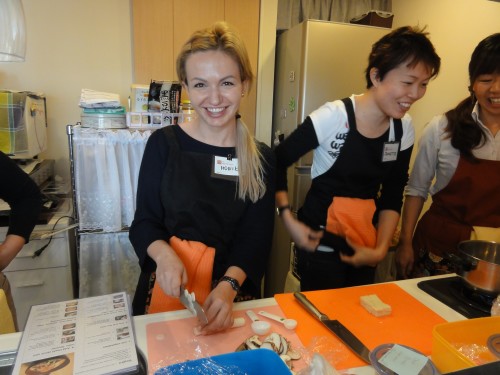2012-03-11

Last Wednesday we had two very friendly expats from Poland and Malaysia participate in our cooking program. Right now most of the Nagomi Kitchen program participants are travelers visiting Japan so not only was it great to see that we are attracting a wider audience but it was fantastic for personal reasons since they reminded me of when I first started living in Japan.
When I first started living in Japan, although I know I had an upper hand compared to others since my cultural upbringing was Japanese, I still had a lot to learn to navigate through the supermarkets in Japan. Even simple tasks like choosing the right miso was very difficult at first. Where I grew up in the States, there were only a couple of brands to choose from so seeing all the options of white, red, and mixed miso was quite overwhelming at first. Watching lots of cooking shows, searching the Internet, ravaging through food magazines, and attending classes that taught me the basics of dashi soup stock, soy sauce, sake, Japanese vegetables and many other topics were what helped me in the kitchen.

When one of our cooking program participants asked about all the basic mushrooms that are sold in Japanese supermarkets and how it was difficult to figure out which one was a shitake mushroom, I could very much understand her struggle. Since I ate shitake, enoki, and nameko mushrooms when I was growing up in Texas, I could at least distinguish those three at the supermarket. But the others like the eringi king trumpet mushroom, the maitake Hen-of-the-Woods mushroom, the buna shimeji brown beech mushroom, and the bunapi shimeji white beech mushrooms, I learned about while living in Japan.
I also noticed that the Nagomi Kitchen cooking program helps expats to learn the Japanese words and packaging of familiar ingredients like sesame oil or potato starch. A lot of them struggle trying to find the ingredients they need to make food from back home so by the end of the lesson they know what to look for and also know how to use those same ingredients to make at least one or two Japanese dishes.
So my hope for the Nagomi Kitchen program is to not only be a program for those visiting Japan to get exposed to Japanese food, but to support new expats in Japan so they can get a head start and become more comfortable in their new kitchen.
We’ve actually had a few people in the past participate in our program because it was given to them as a gift from friends or family so maybe the Nagomi Kitchen cooking lesson might be a good gift idea to welcome fellow expats to their new life in Japan?
Note: we no longer conduct Nagomi Kitchen cooking classes but feel free to look for Nagomi Visit hosts who are interested in cooking with you by checking their profile pages. Nagomi Visits are not cooking classes but it will be an enjoyable experience like cooking with a friend.
 Nagomi Visit
Nagomi Visit

